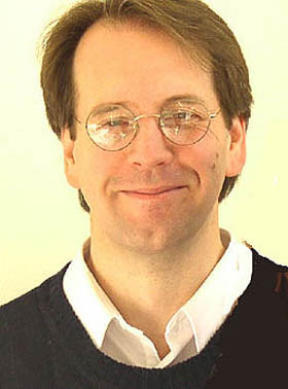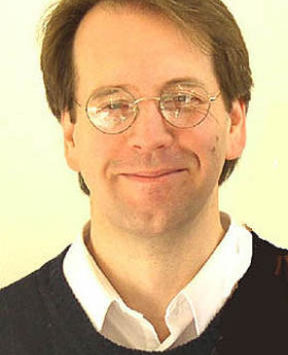What is next for podcasting?
This question is very often on my mind. I just attended the South by Southwest conference in Austin, Texas and spoke on a panel about Podcasting 2.0 with online media legends Chris Pirillo of Lockergnome and the Gnomedex conference, and AudioBlog.com founder Eric Rice.
This Podcasting 2.0 session did not exist a few short weeks ago. I find that interesting, as the SXSW Interactive conference only had one other panel about podcasting and it was about event-based podcasting. This says something significant about where we are today with podcasting. It says to me that we have a long way to go to meet the expectations set by all the podcasting media hype over the past year. Could it be that too many of the technology early adopters and creative geeks have just accepted podcasting and are moving beyond it to video as the next hot thing to add to their online tool kit? Many never tried to create a podcast. But many did try audio podcasting, resulting in a new term called Podfading to describe a growing number of long-tail or citizen podcasters who are podcasting less or have stopped.
Were seeing many new podcasts start up, while others disappear. This is a balancing out as major media embrace podcasting and some of the early topic genres decline as too many podcasts exist for some topics. I also believe that since listening time is so short, quality is rising to the top and pushing out many early and lower quality podcasts. I also believe that many podcasters expect to be able to make money from sponsorships and advertisers. This has been slow to happen and thus they podfade, as it is a lot of work to keep up a daily or weekly podcast.
The buzz and hype of podcasting seems to have faded as well. I still get emails and phone calls from people and companies wanting to learn how to podcast. Yet I think podcasting has moved into an early mature stage for content creators, but is still in the very early stage of listener adoption. The big boom of podcasting was and continues to be more about the creation side and less about listening.
I think back to the article that Wired published — Podcasting: The Death of Radio — with a front-page graphic of a bullet smashing through a regular battery powered radio. If anything, podcasting has given a growing number of broadcast radio programs a new form of distribution and a renewed motivation to be more unique and creative about content. I do think that radio as we know it today is changing, but over a much slower time frame, as it is a generational movement and not an overnight death watch as many predicted.
Im an early broadcast radio podcaster, doing mp3 enclosures in RSS feed since September 2004. This was just after Adam Curry put RSS enclosures and a software program together to automatically capture and download mp3 files from those RSS feeds. It seemed like a novel concept at the time and it turned out to be a worldwide media changing event. It did change things for people who were already inclined to create and consume online digital media content. We have seen podcasting spread worldwide since September 2004, when these major media and citizen media folks embraced it, jumping on the bandwagon because of the massive media hype that was given to podcasting in newspapers and online media over the past 18 months.
The word but keeps coming up in my mind as I think about podcasting and where it really is today in the minds of everyday online users, not the geek early adopters like Chris Pirillo, Eric Rice and myself. The but, to me, means most people in the online world do not coonsume online media as a true podcast by definition and the majority of online users of the Internet do not even know what a podcast is after 18 months of hype.
What this is really saying is that the real growth of listeners from the huge pool of ordinary pedestrian Internet users has not yet climbed aboard the cybertrain to consuming bliss on a portable digital media player device or mobile phone.
I believe one of the long-term issues with the growth of podcasting is its tight linkage with a specific listening device — the iPod. Many of the early podcasters disliked the fact that podcasting was linked up so much with the iPod. Many felt that this would, in the long run, be a problem as other significant listening platforms, devices and media players come into the portable media market in a big way, that we will see audience and media branding confusion in the marketplace. I believe that we are seeing the beginnings of this negative confusion already.
Case in point: the fact that Microsoft will be integrating RSS into Windows Vista and the inevitable growth of Windows Play For Sure media player platform devices, mobile media phones and mini-computer devices like the much hyped Microsoft Origami media and full PC device. We also see other new devices hit the market like the new Creative Zen Vision and the ZenCast.com content directory. The Zen Vision is a great alternative device to the iPod and we will see more and more new platforms develop to consume portable media via RSS feeds.
The other significant new podcast listening platform is the long anticipated growth of mobile media enabled phones as a great potential device for listeners to listen to portable media files that come from RSS feeds or directly over wireless carrier-based Internet connected listening applications. These mobile phone applications will remove the need for anyone to know about RSS XML feeds. The truth is listeners do not care about RSS feeds as they only want the content they want in an easy navigational process.
Mobilcast (Mobilcast.com) is an example of a mobile phone podcast listening software program that is made by Seattle-based Melodeo.com (disclosure I am a Sr. Marketing Manager for Melodeo Mobilcast).
This Mobilcast software application installs on a growing list of mobile media capable phones that allow you, through an unlimited wireless Internet plan through a wireless cellular phone carrier, to deliver via the choice of a Listen Now stream or a download to your phone anywhere. The data we are seeing is if people have a choice whether to stream a podcast content file or download that file, they will choose to stream 5 to 1. The present delivery to the phone is not even in an mp3 file format. It is via a more compressed AMR audio file format. This is another example of how the market is changing and it is forcing alternative distribution platforms as technology changes consumption patterns.
In this above example, Podcasts are just audio and video content sources. I wonder whether podcasting will be known more in the history of media as content media types or a new type of media distribution? I believe that we are seeing new types of content being created for portable media device consumption. Just go see NPRs alt.NPR podcasting program and you will see the birth of high quality long-tail or citizen created content being distributed by major media sources.
While it was a great ride at the lift off of podcasting to the iPod, our future may include a mobile iPhone media player phone and many other media devices. But one thing is clear and its that digital media will be consumed in many more devices and platforms than Apples iPod.
I do believe that we are seeing the growth of unPodcasting and coming growth of Mobilcasting on multimedia enabled mobile phones.
Rob Greenlee is a Marketing Executive for Seattle-based Melodeo Mobilcast at Mobilcast.com. He also hosts one of the original podcasts at WebTalk Radio at http://WebTalkRadio.com . Rob also creates podcast programs for ITConversations.com and Mobilcast Studios. He can be reached via email at rob@webtalkradio.com.







